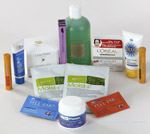Public Awareness of Nano Grows - Majority Remain Unaware
Poll Reveals Education & Government Oversight Key to Unlocking Nanotech Potential
 WASHINGTON— Research findings released today from the first major national poll on nanotechnology in more than two years indicate that while more Americans are now aware of the emerging science, the majority of the public still has heard little to nothing about it. The poll also finds that the public looks to the federal government and independent parties to oversee nanotechnology research and development. These results, according to experts, necessitate increased education and stronger oversight as a means to increase public confidence in nanotechnology.
WASHINGTON— Research findings released today from the first major national poll on nanotechnology in more than two years indicate that while more Americans are now aware of the emerging science, the majority of the public still has heard little to nothing about it. The poll also finds that the public looks to the federal government and independent parties to oversee nanotechnology research and development. These results, according to experts, necessitate increased education and stronger oversight as a means to increase public confidence in nanotechnology.
The poll, a telephone survey of 1,014 U.S. adults, was commissioned by the Project on Emerging Nanotechnologies at the Woodrow Wilson International Center for Scholars and conducted by independent research firm Peter D. Hart Research Associates in August 2006.
Findings reveal that one in 10 Americans have heard a lot about nanotechnology and 20% say they have heard some – nearly double the number of Americans aware of the technology in 2004. But, 42% of Americans have no awareness of it at all. Older Americans and women, the groups most likely to use consumer products containing nanotechnology materials such as skin-care products and cosmetics, are the least informed about nanotechnology. Importantly, those individuals with an awareness of nanotechnology are more likely to believe the benefits of this emerging technology outweigh the potential risks—supporting experts’ assertions that open discourse and information about nanotechnology is crucial in establishing positive sentiment among the American public.
“Nanotechnology is increasingly being incorporated into Americans’ daily lives, from the sunscreens that they wear to the golf clubs they swing and the computers they operate. With this increased use, specifically in those products that are ingested or used topically on the skin, it is essential that the public be aware of what nanotechnology is and the benefits and potential risks it presents,” said David Rejeski, director, Project on Emerging Nanotechnologies. “Our purpose in conducting this poll is rooted in the very heart of the Project’s mission: to spark discussion about nanotechnology’s promise and about potential health and environmental risks. The findings indicate the time is ripe for government and industry to do more to educate and engage Americans about nanotechnology’s tremendous potential and to conduct strategic research into possible risks.”
Findings from the survey also indicate that majorities of Americans feel that the federal government (55%), universities and independent researchers (54%) have a role in overseeing scientific and technological advancements such as nanotechnology rather than relying on self-regulation by private companies and industry, especially for non-prescription over-the-counter (OTC) cosmetics and skin care products. In fact, only 12% of consumers believe the companies that manufacture these products should be exclusively responsible for regulating their safety.
Other findings from the Public Poll on Nano Awareness and Trust include:
Men aged 18 to 49, adults with at least a college education, and adults with higher incomes are more likely to have heard about nanotechnology.
Fifty-nine percent of adults age 65 and over have not heard about nanotechnology.
More than one third (35%) of the public believes that the risks will outweigh benefits, 15% think the benefits will outweigh risks and 7% say that the risks and benefits will be about equal. Forty-three percent are not sure.
More than half (52%) of women are not sure about the benefit/risks trade-off, compared with 34% of men. Fifty-eight percent of older women (age 50 and above) are not clear about the trade-off.
Americans who have heard a lot about nanotechnology and men aged 18 to 49 are most likely to believe that the benefits of nano outweigh the risks. Almost half (46%) of those who have heard a lot, and 25% of men aged 18 to 19 think benefits will outweigh risks.
Political party affiliation is not a factor affecting opinions on oversight responsibility.
The poll results come just prior to the Food and Drug Administration’s first major public meeting on FDA-regulated products containing nanotechnology materials on October 10. Additionally, the U.S. House of Representatives Committee on Science will hold a hearing on September 21 on “Research on Environmental and Safety Impacts of Nanotechnology: What are the Federal Agencies Doing?” Dr. Andrew Maynard, chief science advisor of the Project on Emerging Nanotechnologies will testify.
September 19, 2006
Summary
Research findings released today from the first major national poll on nanotechnology in more than two years indicate that while more Americans are now aware of the emerging science, the majority of the public still has heard little to nothing about it. The poll also finds that the public looks to the federal government and independent parties to oversee nanotechnology research and development. These results, according to experts, necessitate increased education and stronger oversight as a means to increase public confidence in nanotechnology.
Related
Report Release Event Page and webcast
Focus Group Podcast – Requires Quicktime 7
